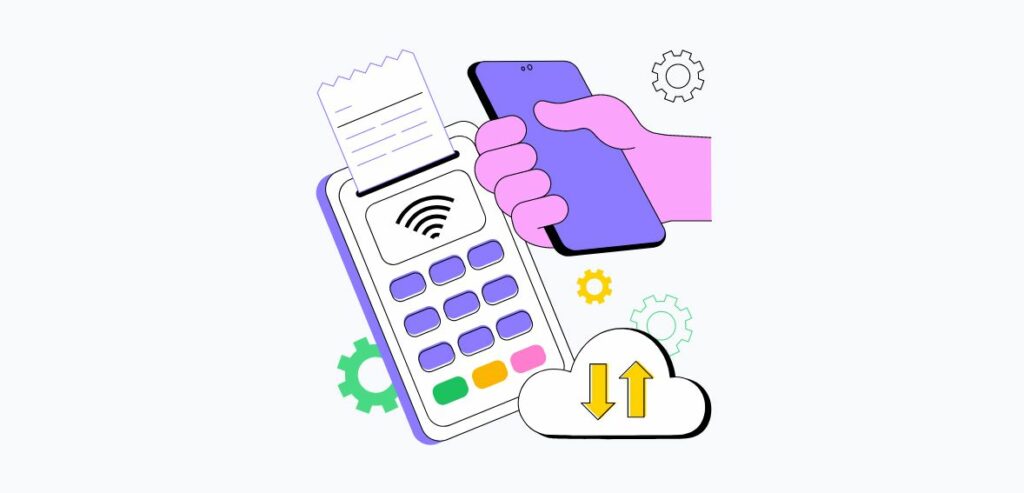A POS system is the core of any business. Without a reliable POS system, no business can grow. A POS is the central hub of business operations, seamlessly integrating with all its activities.
Business prefer reliable POS system that can handle business-related challenges easily. With technological advancement, POS are getting more efficient and offer many features to streamline a business. Let us understand the most essential software features for POS systems to make a business successful in 2024.
10 Important Software Features for POS Systems to Look for in 2024

A POS system handles critical aspects like payment processing, inventory management, reporting, invoicing, employee training, brand marketing, and CRM. A POS system should offer an all-in-one solution to the merchants. Let’s take a look at the essential POS software requirements that are a must for any business:
- Diverse Payment Options
A POS system should offer a variety of payment methods. The customer should be able to pay with a credit or debit card or other methods that have become popular after the pandemic. Options like wallet payment or tap to pay, Apple Pay, Samsung Pay, Google Pay, etc., are common ways that have become popular in recent years.
Studies have shown that having various payment options can increase conversion rates by as much as 30%. This becomes more important if you serve a large number of Gen Z. They prefer to pay with modern methods rather than through a credit or debit card, which are traditional ways to pay. Additionally, having the capability to create and accept store credits and gift cards will bring in additional business.
Offering such flexibility to your customers can significantly enhance their experience and satisfaction.
- Inventory Management Options
Another important feature is that a POS system should be able to track and manage the inventory of products efficiently. There are various steps involved in inventory management. But, the first step that is the most difficult is adding or uploading the products. Any POS system that provides features to manage products easily will win the competition. A POS system should be able to keep track of stock levels accurately.
Efficient inventory management is crucial for the success of any business. In the era of multi-branch stores, POS should handle the stock level efficiently without less dependence on the employee’s input.
A reliable POS system should enable merchants to track stock levels in real-time, receive timely low-stock alerts, and provide valuable insights into sales trends. This functionality prevents low stock or overstock situations, saving the business from losses.
Here are some important inventory management options that a POS system must have:
- Real-time inventory tracking
- Stock counts
- Reordering points
- Low-level warnings
- Stock Categorization
- Bulk product imports
- Easy product searches
- Product variants
- Returns and exchanges

- Security and Compliance
A POS system has to deal with some critical information related to customers. A secured POS system with a robust and highly-secure payment processor is thy primary defense against potential data theft and unauthorized access. A POS system and the payment processor should comply with the Payment Card Industry Data Security Standard (PCI DSS).
In addition to the PCI DSS compliance, your POS should incorporate extra security features to combat various cyber threats that are prevalent today. Given the constant concerns about data breaches and security threats, your POS system should have security measures like data encryption, user access controls, and regular security updates.
- Shipping Integration
A POS system with shipping integration is a must to run a modern business. This function is crucial to streamline the transportation of items to the customers. A system with this feature enables businesses to coordinate with the delivery carrier easily.
Such POS systems have features like printing shipping labels along with receipts. Thus businesses can successfully oversee their shipping processes, decrease mistakes and serve the customer with an accurate and timely delivery updates.
An efficient POS system with shipping integration helps in timely delivary of goods to the customers and low error rates at the store.
- Employee Management
Any modern POS system should include employee management features, allowing businesses to track sales, store activities of the employees, and their performance. This functionality simplifies identifying top earners and highlights employees who may benefit from additional training. These tools also enable you to organize competitions and reward outstanding performers.
Specific POS systems go a step further by incorporating a built-in time clock to track work hours and assist in creating employee schedules. If you’ve already chosen a suitable time and attendance system or effective employee scheduling software, check if it seamlessly integrates with your POS system.
The significance of an employee management system within a POS system is as follows:
- Improving Efficiency: By consolidating all information, including product images, within the POS system, efficiency is boosted, contributing to a streamlined operation.
- Tracking Attendance and Hours: POS systems empower owners and managers to monitor employee hours and attendance efficiently.
- Increasing Sales: POS systems are important for boosting sales and enhancing customer and employee experiences. Some systems provide insights into sales patterns, allowing you to identify areas for improvement and track progress.
- Enhancing Employee Satisfaction: A dependable POS system increases employee satisfaction through improved efficiency and training opportunities.
- Improving Training: Properly setting up employee management systems ensures employees receive practical training and understand their responsibilities.
- Omnichannel Experience
Modern stores are omnichannel. That is, they function in-store as well as online. Customers prefer to check the retailer’s website or app to confirm product availability before physically visiting the store. Some customers check the product once in the store and order the same product online. Customers can order online using the store’s website or other retail websites like Amazon. A modern POS system handles both offline and online payments.
Here are two important features that a POS must handle for a positive omnichannel experience for customers
- Online Sales Management: This feature aids in regulating e-commerce operations, leading to high trust among online customers. This also helps in generating repeat orders.
- Omnichannel Platform: Ensuring sales support across various channels, whether customers are in your physical stores or accessing your business through desktop computers, mobile devices, or social media, is essential. This approach enhances the overall customer experience and expands your business reach.
- Appointment Booking
An appointment booking feature in your POS is crucial to streamline your business. It can be a game-changer for businesses seeking efficiency and convenience for their clients.
While this is not a standard feature, some POS systems offer appointment-booking capabilities. This allows seamless integration with their online store or website. Appointments and sales are made on a unified platform, making it easy for the business to manage things. The appointment-setting feature isn’t limited to specific industries; it’s versatile and beneficial for various B2B businesses. This feature is a lifesaver in healthcare, real estate, nail salons, wellness spas, or repair services.
- Reports and Analytics
A system with insights into business operations is essential for modern-day businesses. POS systems with analytic features use real-time data from multiple sources like employee activity, transaction history, sales volume, and customer information. Users can further generate customizable reports to improve their strategies and plans.
Different reports can be generated based on real-time data from profit margins from different category or group of products or services inventory performance, employee activity, customer profiles, and revenue earned. Implementing analytical and business intelligence tools empowers a company to make data-driven decisions for better growth.
- Credit Card Processing
POS system with credit card processing capabilities is common. A business should prefer a POS system compatible with various payment processors. This gives them the flexibility to choose among the best credit card processors. This option lets you compare rates and switch processors if needed, offering alternatives in case of issues with a particular processor.
- Discounts and Promotions
A POS that can handle discounts and promotions is an asset for the business. This feature helps run special discounts and promotions for slow-moving products. Product sales can be down for various reasons, such as a lack of consumer interest or stiff competition. By offering a discount on the struggling product, you may be able to entice hesitant customers to make a purchase.
If your POS system readily accepts promo codes, discounts, and other promotions, a business has greater flexibility in measuring its retail marketing strategies. An efficient POS system that seamlessly integrates these promotional tools allows businesses to track which offers are most effective at driving sales and increasing customer engagement. This data-driven approach empowers the merchants with valuable insights into what resonates with your target audience so they can fine-tune their marketing efforts.

Conclusion
When you choose a point-of-sale system for your business in 2024, consider features that can help make things run smoothly. Having options for major credit cards and digital payment methods makes it more convenient for customers to pay and may help increase sales. Keeping close track of inventory in real-time with updates and alerts can help prevent issues from being out of stock. Meeting security standards like PCI DSS protects customer information. Integrating shipping smoothly improves how satisfied customers feel and reduces mistakes.
Features for monitoring sales and reviewing employee performance can help operations run efficiently. A system that allows an omnichannel experience along with booking appointments and detailed reports gives valuable insights for informed decisions. Processing credit cards directly or through a service ensures transactions go through without problems. Lastly, integrating discounts and promotions well allows for effective analysis of marketing strategies. A well-equipped POS system acts as a helpful partner to optimize operations and enhance overall business achievement.
Frequently Asked Questions
What Features Are Essential for a Point of Sale (POS) System?
Beyond the standard ordering and payment functions, key features of a top-notch point-of-sale (POS) system encompass inventory control, customer relationship management (CRM), robust reporting and analytics, and effective employee management. However, the significance of each feature may vary based on the unique needs of your business.
What Are the System Requirements for POS Software?
To operate a POS system smoothly, you'll need a computer with a CPU speed of 1 GHz or higher, a minimum of 1 GB of RAM, and at least 3 GB of hard drive space.
What Does the Future Hold for POS Systems?
The future of POS systems is evolving towards cloud-based solutions. In the digital age, cloud computing transforms traditional POS systems that store data on local servers. The shift to cloud-based systems ensures real-time data synchronization, accessibility from any location, and seamless updates.
What Are the Advantages of Using a POS System?
In essence, a POS system enhances your operations for customers by facilitating faster item scanning, reducing waiting times, and expediting payments. These operational improvements contribute to providing superior service, encouraging customers to return to your store for their future purchases.

